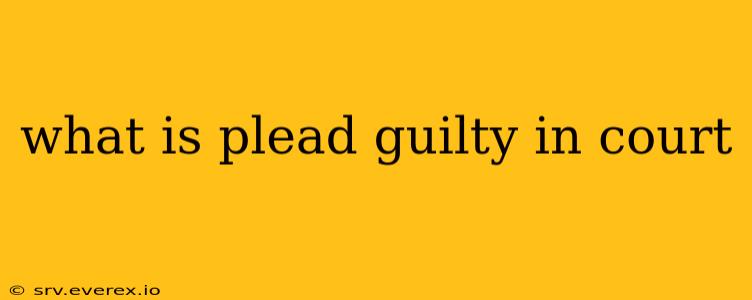Entering a guilty plea in court is a serious decision with significant legal ramifications. It means admitting to committing the crime you're accused of, foregoing your right to a trial, and accepting the consequences the court imposes. This post will explore the meaning of pleading guilty, the process involved, and the implications for your future.
Understanding the Act of Pleading Guilty
When you plead guilty, you're essentially telling the judge, "Yes, I did it." This admission removes the need for a trial, where the prosecution would have to prove your guilt beyond a reasonable doubt. By pleading guilty, you bypass this process and accept responsibility for your actions. This doesn't necessarily mean you actually committed the crime; it means you're acknowledging that the prosecution has enough evidence to convict you, and you'd rather avoid the uncertainty and potential for a harsher sentence that comes with a trial.
Key Differences from Other Pleas
It's important to differentiate a guilty plea from other possible pleas:
- Not Guilty: This plea asserts your innocence, and the case proceeds to trial.
- No Contest (Nolo Contendere): This plea means you're not admitting guilt but are accepting the consequences of the charges. It avoids the admission of guilt for civil liability but still results in a conviction. This plea might be strategic in certain situations but generally carries the same sentencing implications as a guilty plea.
The Process of Pleading Guilty
Pleading guilty isn't a simple act. It usually involves:
- Meeting with your attorney: Before entering a plea, you must have thorough discussions with your lawyer to understand the charges, potential penalties, and the implications of your plea.
- Reviewing the plea agreement: Often, a plea bargain is negotiated with the prosecution, where you agree to plead guilty in exchange for a reduced charge or sentence. Your lawyer will review this agreement with you.
- Allocution in court: In court, the judge will ensure you understand the charges, the rights you're waiving, and the potential consequences. You'll be asked to formally state your plea, and the judge will confirm that it's voluntary and informed.
- Sentencing: After accepting your plea, the court will set a sentencing hearing, where the judge will determine your punishment based on the charges, your criminal history, and other relevant factors.
Implications of a Guilty Plea
A guilty plea has long-lasting consequences:
- Criminal record: A guilty plea results in a criminal conviction, which will appear on your background check. This can impact your future employment, housing, education, and travel opportunities.
- Sentencing: You will receive a sentence determined by the judge, which could include fines, probation, community service, or incarceration.
- Collateral consequences: Beyond the immediate sentence, a guilty plea can lead to other consequences, such as the loss of certain licenses (e.g., driver's license), immigration issues, and difficulties obtaining loans or insurance.
When to Consider a Guilty Plea
A guilty plea might be a strategic choice in certain circumstances, such as:
- Strong evidence against you: If the prosecution has overwhelming evidence, a guilty plea might lead to a more lenient sentence than a potential conviction after a trial.
- Desire to avoid a trial: Pleading guilty can save time, stress, and the expense of a trial.
- Acceptance of responsibility: A guilty plea allows you to take responsibility for your actions and begin the process of rehabilitation.
However, it's crucial to remember that this decision should never be made lightly. You should always consult with a qualified legal professional who can thoroughly assess your situation and advise you on the best course of action.
Disclaimer: This information is for educational purposes only and does not constitute legal advice. Consult with an attorney for advice regarding your specific legal situation.
